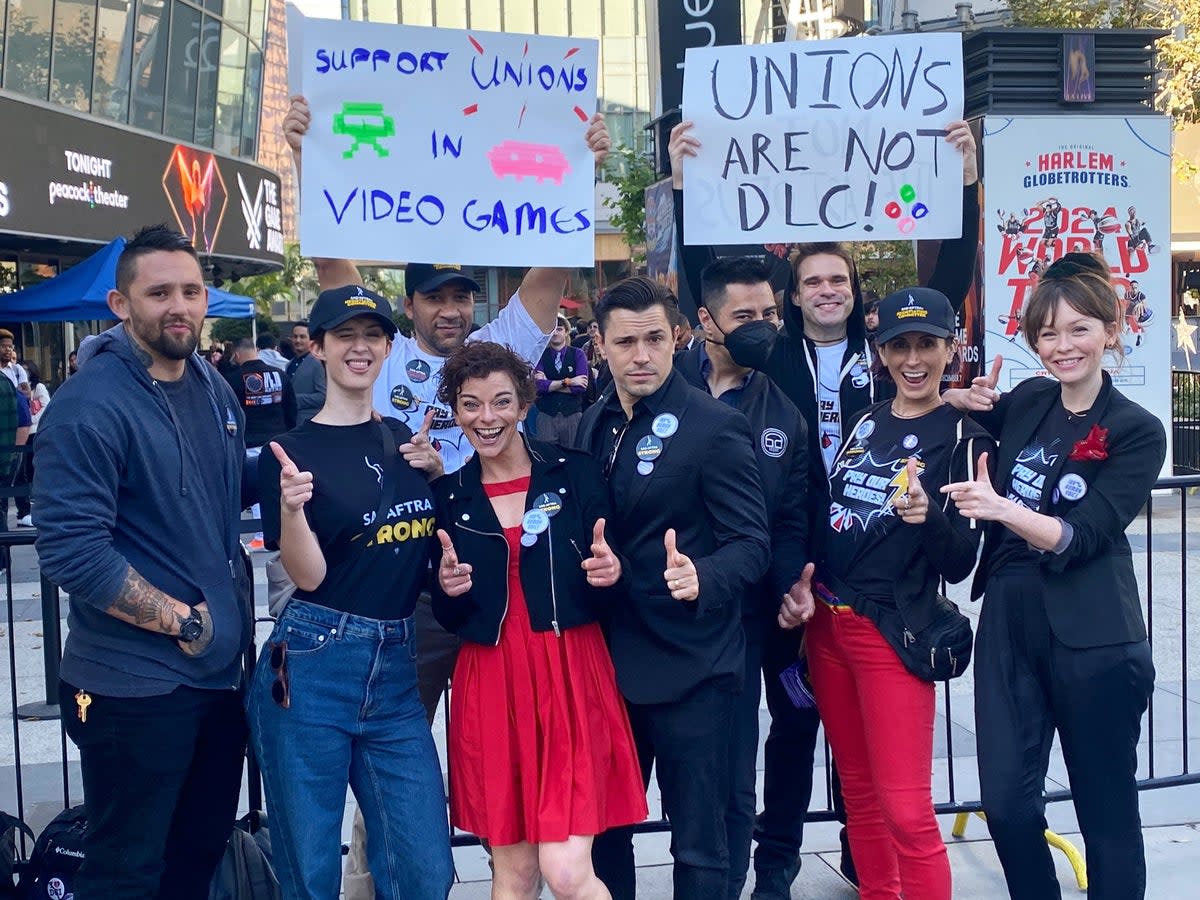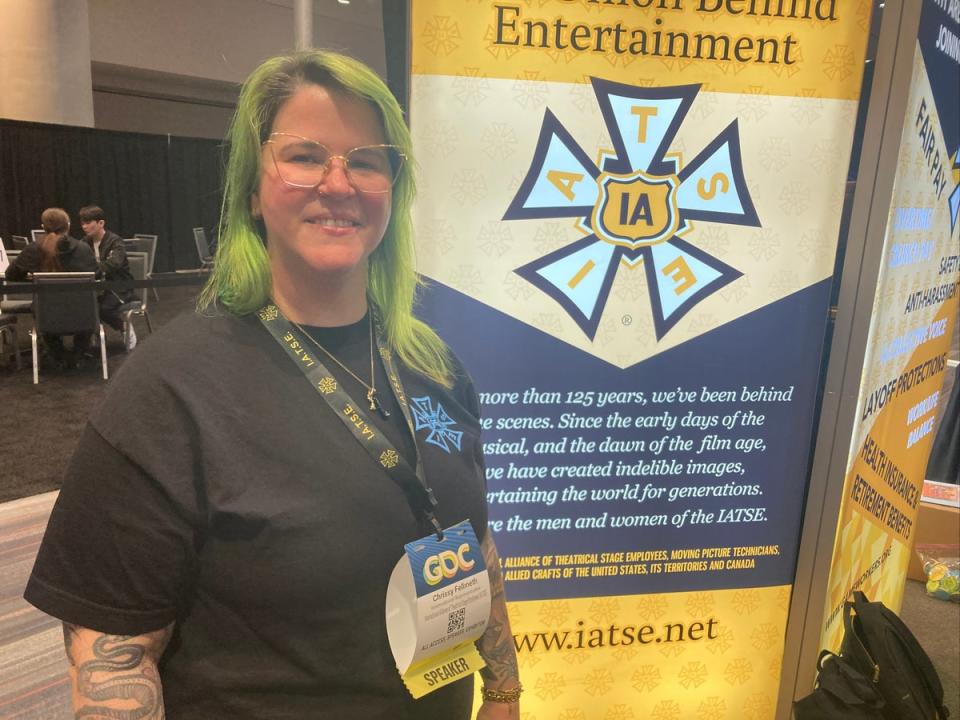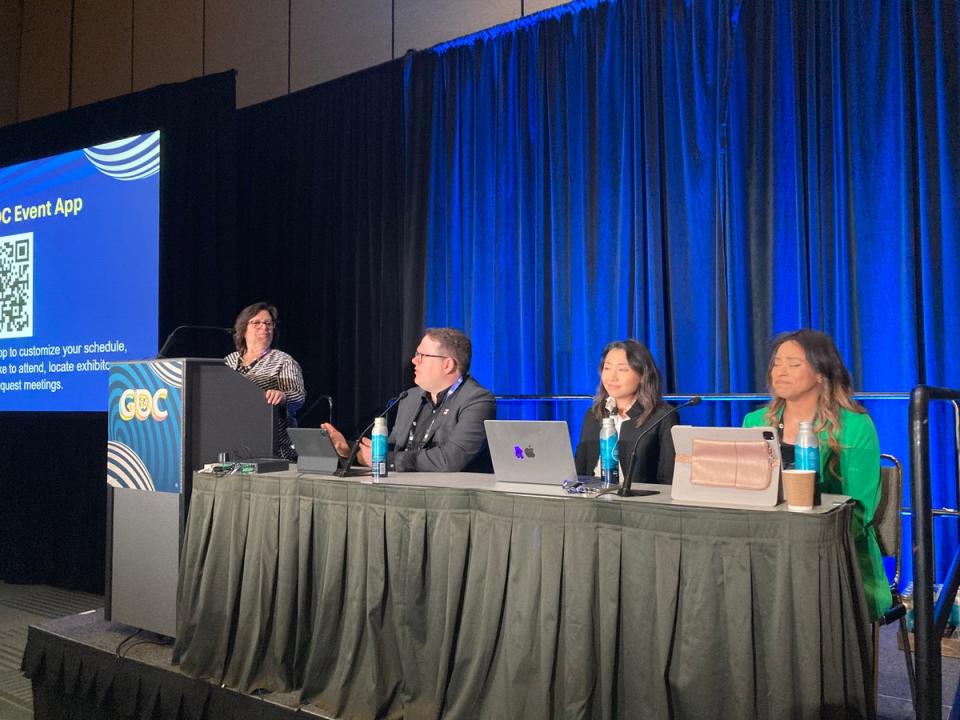‘For now, they still need you’: Video game creators scramble to unionize as AI threat looms

With his black beanie hat and expressive facial muscles, ‘Bloom’ appears much like any other modern video game character – right down to his emotional backstory.
"Yes, I’ve lost many," says Bloom when asked what the resistance struggle had cost him. "My son, my friends, my home. But every loss only fuels my determination to keep going."
What was unusual was that Bloom’s words, and the voice he spoke them in, were generated on the fly by artificial intelligence in response to the player’s verbal questions, based on a character profile drawn up by human writers.
Unveiled last month by the French gaming Ubisoft, Bloom and his comrades – though gawky and sometimes comically bland – were part of a tech demo intended to show how future video games could use generative AI to respond spontaneously to what players say and do.
Across the world, gaming companies such as Square Enix (creators of the Final Fantasy series) and the Chinese tech giant Tencent (which owns League of Legends) are racing to hitch a ride on the AI bandwagon.
Yet this corporate hype has also galvanised another conversation that has been bubbling up through the video game industry in recent years: unionisation.
Spurred by an ongoing tidal wave of layoffs, game developers are increasingly banding together to protect their jobs or improve their working conditions, with a steady trickle of studios becoming unionised since 2018.
And while the mass job cuts appear to be the main reason, union leaders say that fear of automation is only pouring fuel on the flames.
"AI is a huge concern to people working in the games industry, especially to more creative parts like concept artists, animators, writers," Chrissy Fellmeth of the International Alliance of Theatrical Stage Employees (IATSE) told The Independent in an interview at the Game Developers Conference.
"The layoffs have really made people aware of the fact that they do not have consent over their working lives,” Fellmeth said. “That changes are being made unilaterally without their consent. And they’re looking for solutions."

During last month’s GDC in San Francisco, developers flocked to talks and panels about how to unionise their workplaces, set up worker-owned co-ops, or prepare for the future impact of AI.
At the forefront of this battle are voice actors and other performers represented by the powerful Hollywood union SAG-AFTRA, which last year forced film and TV studios to agree on new restrictions on AI after a 118-day strike. Fresh from that victory, the union now wants to forge a similar deal with game studios – through another strike if necessary.
"We’re not at that point just yet, but we are awfully close," the union’s national executive director Duncan Crabtree-Ireland told The Independent. "We’re talking weeks, not months.
"The companies have a very simple decision to make: either treat all of your performers fairly and give them equal AI protections, or don’t. And if they’re committed to not doing that, there’s no reason why we should wait."
Game actors battle their digital clones
In the wake of last year’s Hollywood strike, a strange video circulated on social media that appeared to show Crabtree-Ireland denouncing the agreement that he himself had just helped negotiate.
In fact this was an AI-generated deepfake, apparently created in order to undermine the deal (which some actors believed did not go far enough). And it was a foretaste of what many actors fear could happen to them if generative AI goes unregulated.
Proponents argue that AI could reduce the colossal production costs of modern titles and expand the scope of projects that can be undertaken by small teams. Some even say it could realise the perennial (if controversial) fantasy of building a "holodeck" – that is, an all-encompassing virtual world that can seamlessly simulate whatever players request.
"It’s not always about replacing; sometimes it’s about creating completely new things," said Russell Harding of Saltwater Games, who gave a talk at GDC entitled ‘Harnessing Generative AI to Create Unlimited Content’. "It empowers us to do things that we couldn’t do."
Performers, however, are sceptical. In a recent poll by the US National Association of Voice Actors, 12 per cent of respondents said they had lost a job to an AI-generated voice. Only ten per cent said they had agreed to have their voice replicated by AI, and six per cent said it had been done without their permission.
Modern generative AI is only possible because it is ‘trained’ on vast quantities of human-generated data, which some critics argue amounts to little more than obfuscated theft on a massive scale. Some game actors have had their voices press-ganged into unofficial pornographic add-ons.
Already, Crabtree-Ireland says performers are being asked to sign away "all-encompassing" rights to replicate their voices or movements using AI without any extra compensation, sometimes buried in small print and often as a condition of getting the job.
"They’re being asked to sign a provision that says: ‘I give you the consent to use my image, voice, and likeness in perpetuity throughout the universe, by any means of technology now known or hereafter invented’," Crabtree-Ireland said. "That’s not okay."

In response, the union is attempting to add curbs on AI to the next version of its Interactive Media Agreement, which was first struck in 1993 and now covers around 140,000 people. It is currently negotiating with ten major companies including Activision Blizzard (which owns the Call of Duty and Warcraft franchises), Electronic Arts (FIFA, Mass Effect), and Epic Games (Fortnite).
SAG-AFTRA wants companies to have to get informed consent from performers before making any kind of digital replica, and to give them veto rights over any future use of that replica. The union also wants performers to get extra wages every time their replica is used.
But progress has been slow, and in September union members voted overwhelmingly to authorise a strike if negotiators deem it necessary. The big sticking point, argues Crabtree-Ireland, is that the companies have agreed on AI protections for voice acting but not for other types of performance such as motion or face capture.
"As a union, we’re not going to leave anyone behind," he said. "We’ve already given them extensive additional time to work on this issue, at their request... I think there’s a path for us to make a deal without a strike. But if we have to go on strike, we will."
A spokesperson for the ten companies declined to comment on specific points while the negotiations are still ongoing. But they said in a statement: "We are continuing to negotiate in good faith and have made tremendous progress. We have reached tentative agreements on the vast majority of proposals and remain optimistic that we can reach a deal soon.”
'This is the worst it's ever been'
The SAG-AFTRA dispute comes amid a historic surge in union activity and pro-union sentiment, both within and without the games industry.
Since 2022, game workers have formed unions at Sega of America, CD Projekt Red, Activision Blizzard, and numerous other companies across the world. Quality assurance workers, long treated as inferior adjuncts to "real" developers, have been especially active.
The biggest factor is an unprecedented round of layoffs, seemingly driven by corporate mismanagement and the spiralling cost of blockbuster games. That has compounded longstanding complaints such as brutal "crunch" hours, poor job security, and endemic sexual harassment.
The mood is so grim that, at one point last month, GDC attendees gathered in a park near the conference centre to vent their frustrations in an organised scream-along.
"This industry has always been volatile. But it feels unprecedented, the moment we’re in," said Sarah Elmaleh, a veteran voice actor and director who chairs SAG-AFTRA’s interactive media committee. "It’s the worst I think I’ve seen in terms of layoffs, despair, instability, and just lack of responsible management."
Most cathartic at #gdc GDScream screaming at the state of the game industry. #unionize pic.twitter.com/XLqg1xZX8a
— Hideo KoJimmy (Jimmy Chi) (@TenaciousChi) March 20, 2024
Amid such chaos, Elmaleh says it is not only actors who are deeply worried about how their bosses will deploy new technology.
"I think a lot of companies think that they can cash in on this by laying off a bunch of workers and replacing them with AI," one video game writer, who asked to be anonymous for fear of negative repercussions from their employer, told The Independent. "They’re gonna have a rude awakening when the bubble bursts, but a lot of people are going to suffer from it."
Some game workers, including some SAG-AFTRA members, reject any use of AI to create content. When the union announced in January that it had inked a deal with an AI company called Replica Studios to let performers licence out digital likenesses, it was sharply criticised by prominent voice actors.
Excuse me? With all due respect…you state in the article “Approved by affected members of the union’s voiceover performer community.” Nobody in our community approved this that I know of. Games are the bulk of my livelihood and have been for years. Who are you referring to?
— Steve Blum (@blumspew) January 9, 2024
I WILL NOT SIGN MY OWN FUCKING PINK SLIP!
You betrayed us.
Few regards,
A Voice Actor@sagaftra— Greg Baldwin (@GregBaldwinIroh) January 10, 2024
But Crabtree-Ireland is adamant that performers must be willing to say "yes, and…" to generative AI. "Past history shows that unions or anyone trying to ban technology is not a successful way to fight," he said at a GDC panel. "If we just tried to ban it, we would be giving up the opportunity to help say how it should be implemented."
Fellmeth, of IATSE, shares that stance. "We’re not going to be able to make it go away. Pandora’s out of the box; we can’t put it back," she said. "What we can do is ensure that we have a future."
Either way, organisers believe that there may only be a brief window in which workers can force companies to terms before AI becomes genuinely capable of replacing them.
"Your leverage now," said Fellmeth, "is that they still need you."

 Yahoo News
Yahoo News 
